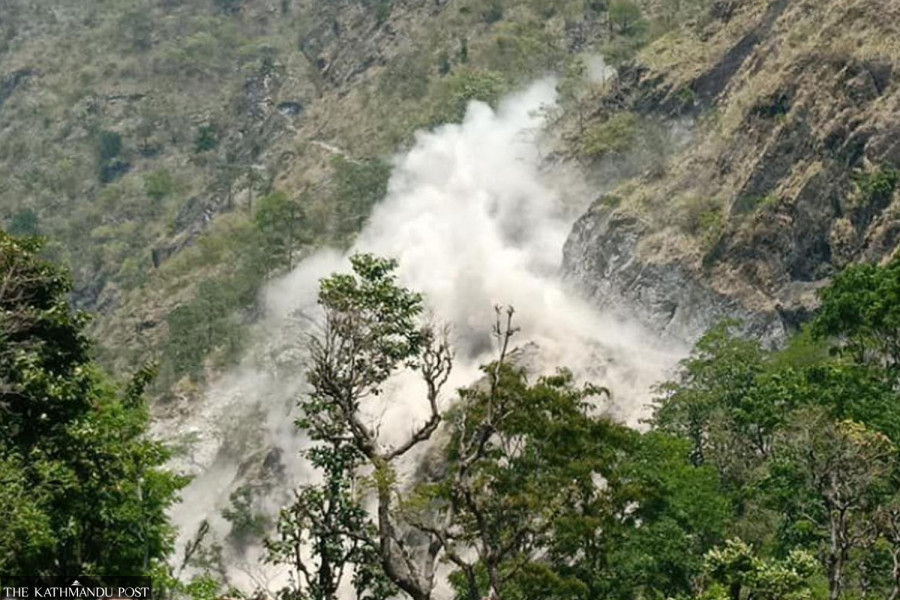National
Project developers can now lend and borrow explosives
Projects that have involved Chinese companies are particularly facing the shortage of explosives due to India’s reluctance to supply them.
Prithvi Man Shrestha
With a number of construction projects facing a shortage of explosives, they can now borrow from other projects that have the substance.
By amending the Explosives Rule 1964, the government paved the way for the construction projects to borrow explosives from other projects as a temporary solution. Earlier, explosives designated for a particular project could be used by that project only.
The government’s move comes at a time when a number of under-construction projects, particularly ones that have hired Chinese contractors, are facing the shortage of explosives.
With India reluctant to supply explosives to projects with Chinese involvement, they are facing troubles to carry out construction- and mining-related blasts.
Kathmandu-Nijgadh expressway, Tanahu Hydropower Company and Huaxin Cement Narayani Pvt, Hongshi Cement Senjen Khola Hydropower are among the projects that faced explosives shortages in recent months.
“The main reason behind amending the rule is to give a temporary solution to the projects facing a shortage of explosives,” said Jitendra Basnet, spokesperson for the Ministry of Home Affairs. “This will help end the situation where some projects pile on the explosives while others suffer due to the shortages of the same.”
He said that before the new rule was introduced, a project could not transfer the excess explosives to another project. “Our aim is to ensure that construction of development projects is not halted without the explosives.”
For example, the expressway project being developed by the Nepal Army has hired some Chinese contractors for different packages.
“The national pride project is one of the important projects facing the shortage of explosives,” said Basnet. Even though the Nepal Army has been producing commercial explosives at its Sunchari Emulsion Plant in Makwanpur district for long, it does not produce enough for all of the country’s infrastructure projects. The army relies on raw materials supplied from India to produce it.
“Because of the shortage of raw materials, new production of explosives remains more or less halted,” Nepal Army spokesman Brig Gen Krishna Prasad Bhandari told the Post last month. “Our production is also not enough to meet the demand for commercial explosives in Nepal.”
According to the new rule, the explosives can be borrowed for the roads, energy projects and other development projects that require blasting of explosives. The projects can borrow the explosives only when they are facing a shortage and cannot get supply immediately and the Nepal Army also cannot supply. “If a project doesn't require explosives immediately and has them in excess, it can provide them to a needy project,” the new rule says.
However, licensed suppliers of explosives say it is not clear whether the government’s rules could contradict with no objection certificate that the Indian Embassy issues to the suppliers.
“We have to make it clear to the Indian Embassy who the end user of the explosives is before the embassy issues its No Objection Certificate,” said Ananda Chaudhary, owner of Tactical Solutions Pvt Ltd, which has been involved in supplying commercial explosives to various projects over the last five years. “I am not sure whether the Indian embassy would issue the No Objection Certificate if it is not confirmed where the explosives will eventually land.”
However, Basnet said that the Indian embassy would understand the issue as the move is aimed at solving the temporary shortage of explosives. “It by no means intends to always supply the material to another project by borrowing from one project,” he added. Nepal has traditionally been relying on the southern neighbour for explosives.
After the project involving the Chinese companies faced the shortage of explosives, Chaudhary’s company last month brought them from China, for the first time in many years to help Chinese contractors of various projects carry out construction-related blasts.
He earlier told the Post that it had supplied 90 tonnes of explosives from China for the Hongshi Shivam Cement Factory located at Nawalparasi and SinoHydro Corporation, contractor for the Senjen Khola Hydropower Project in Rasuwa district. According to him, Hongshi Shivam had sought to build an underground conveyor belt for delivering limestones from mines to the factory.
“We are going to supply an additional 140 tonnes of explosives soon from China for the Senjen Khola Hydropower Project and Huaxin Cement Narayani Pvt Ltd, where the Chinese companies are involved,” Chaudhary said. “We have also received an informal request from the Fast Track project for supply of explosives from China.”




 14.24°C Kathmandu
14.24°C Kathmandu















